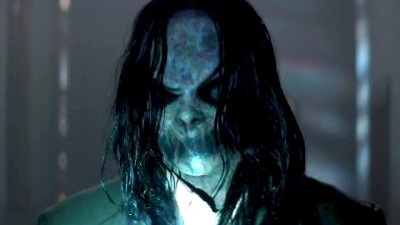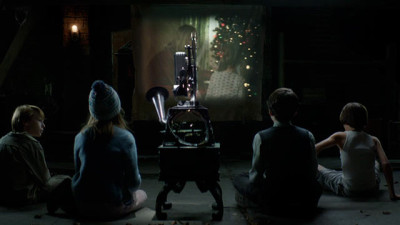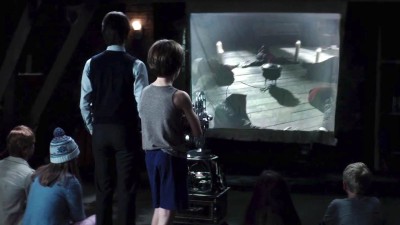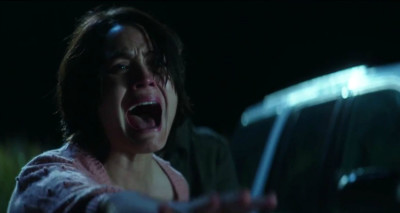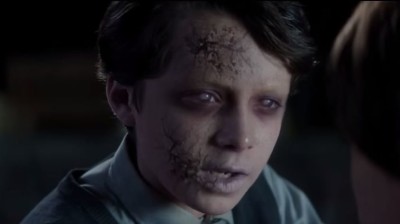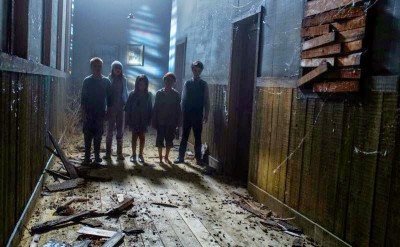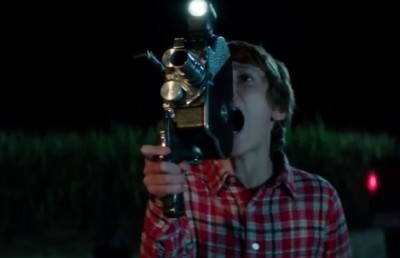A big summer for horror fans as the “Summer of Blumhouse” continues with “Sinister 2″! Already providing us with “Insidious Chapter 3″, “The Gallows” and “The Gift”, Blumhouse continues to terrorize us with genuine jump in your seat fright with “Sinister 2″. And as we know from other Blumhouse banner franchises, one need not have seen the first film to appreciate and understand the sequel.
However, to satisfy the need to know and just to bring you up to speed, 2012’s “Sinister” introduced us to Bughuul, a demon of imposing physical and telepathic terror. We met a true-crime novelist named Ellison Oswalt who moved his family into a house intent on researching the gruesome circumstances that led to the demise of the prior occupants. But true-crime becomes all too true when Ellison finds a box of Super 8mm home movies in the attic and quickly realizes they are essentially “snuff” films of multiple families being murdered on film. In each case, preceding the murders is the disappearance of one child from each family following which are extreme methods of execution, such as electrocution, burning at the stake, drowning. As Oswalt keeps digging, together with young Deputy So & So, they discover the evil that is Bughuul.
Fast forward to the present and “Sinister 2″. “Sinister” director Scott Derrickson now takes on the role of producer as well as re-teaming as co-screenwriter with C. Robert Cargill, paving the way for Ciaran Foy to take the directorial reins. Picking up where “Sinister” left off, Deputy So & So (he still has no name, folks) has left his position in law enforcement, opting instead to work as a private investigator so that he can continue with Oswalt’s work and try to not only solve, but prevent, murders like those Oswalt was researching.
So & So has discovered a pattern for the Bughuul influenced murders and realizes that if he can destroy each home before a family moves in, he can stop the appearance of Bughuul and ultimately, the murder spree. The next location on the murder network is a presumably abandoned Illinois farm, a site where heinous murders had already been committed in a church on the property. Heading there intending to burn down the church and the farmhouse, imagine So & So’s surprise to find a mother, Courtney Collins, and her nine-year old twins, Dylan and Zach, living there. As it turns out, Courtney is hiding from an abusive husband but unbeknownst to her, has inadvertently placed herself and her boys in an even worse situation with the presence of Bughuul.
While knowing the history of the property doesn’t phase Courtney, it does concern So & So. Even more disconcerting is that as the audience sees, Dylan is seeing “ghost kids” and is led down to the basement each night by the head ghost kid Milo, to watch “kill films” made by each of the ghost kids as they murdered their respective families. So & So starts to suspect Bughuul’s presence and a potentially murderous effect on Dylan, yet is focused more on wanting a mano-y-mano confrontation with the ghoul himself.
While mild flirtations occur between Courtney and So & So, an explosive appearance by the abusive husband adds another layer of evil conflict, and no one seems to notice that the quiet and somewhat frail Dylan is not the boy to be worried about. Someone should have been paying attention to Zach.
James Ransone is back as Deputy So & So with an amped performance that plays to a nervous fear, So & So’s intelligence, and a puppy love innocence when So & So is near Courtney. Ransone is engaging and hits some fun comedic beats that rise from So & So’s occasional naivete. According to co-writer Cargill, when constructing “Sinister 2″, he and Scott Derrickson took a look back at “Sinister” and realized, “This guy [So & So] is actually smart. He knows more of what’s going on that Ellison does. He’s really good. So that’s the way we need to go [ with “Sinister 2″]. So [Scott] came up with the idea of just having him be the guy who solves it at the end and catches up. We had this great character there who caught everybody off guard. Everybody thought he was going to be the idiot and by the end of the movie, you’re like, ‘Oh that character’s cool! He’s different.’ For me, it was like, let’s turn him into our Dr. Loomis. Let’s make him our bad guy hunter. Let’s have him be the hero that nobody actually knew was the hero in the first movie.”
As Courtney, Shannyn Sossamon goes for broke and nails it. She is believable as not only a mother, but a mother trying to protect her children and a mother whose lioness instinct rears its head instinctively. On the flip side, Sossamon also infuses that “put your head down and keep moving” attitude into Courtney, making the overlooking of what’s unfolding with her boys believable. Then put her together with Ransone and it’s undeniable chemistry.
When it comes the performances from the kids, Foy and company lucked out in spades. The Sloan brothers, Robert and Dartanian as Dylan and Zach, respectively, are a welcome addition to the cinematic world. Obviously bringing their real life sibling chemistry to the table, each creates individual personas on screen that suit the character traits of Dylan and Zach. But the real standout among the seven young actors on set is Lucas Zumann. As Milo, Zumann gives new meaning to preppy creepy control.
A key component to “Sinister 2″ is the character of Bughuul and thankfully, Nick King returns in the role, bringing his inimitable nuanced physical subtlety which he infuses into the performance. Almost celebratory is King’s use of his hands underneath all of the prosthetics. As a demon with no eyes, no voice, King is perfection with minuscule touches, like the spreading of his hands and rigid stiffness that tells and speaks volumes as to what is unfolding or the telepathic communication between Bughuul and Milo. So well suited to and in tune with Bughuul is King that even Foy finds him indispensable to the role. “There was one day that we had a stand-in for Nick. It was a kind of mess up on behalf of a few people. But the schedule didn’t say that Nick was due on a day he was due. We had a stand-in for Bughuul instead and we put the prosthetics on him. But, it’s surprising. He’s just standing there in the background and he was to do this thing where he brings the rats forward with his hands, and it just felt wrong. It looked like Bughuul but it felt wrong. In the end, we had to go back and shoot it again with Nick. I’m doing very little direction with Nick. He is Bughuul. He knows that character inside out. So once he understands what the shot looks like and what I’m trying to do, because once he comes to set in his full prosthetic he can’t see anything, but I go through the shot with him before he goes off into make-up. . .he just brings it. Nails it.”
Initially hoping to tell “Sinister 2″ exclusively from the POV of the kids, Cargill quickly realized “[T]here’s a lot of stuff in terms of investigation that you just can’t do. It just doesn’t make sense.” which led to expanding Deputy So & So, letting him be the “cypher character” and bring the audience information. “[We] came up with the idea of, ‘What if between the last movie and this movie, Deputy So & So has figured out everything the audience knows and we spend the first ten pages letting the audience know that and reminding the audience that “Hey, by the way, we didn’t really tell you very much in the first one. You don’t know how to stop Bughuul. You don’t know where Bughuul actually came from. You don’t know how he actually seduces the children. Is it possession? Is it obfuscation? Is it illusion? How does he get to these kids?”’ And it was like, well, let’s now unravel that mystery and show that to you and show you all the stuff that you didn’t see.” Cargill and Derrickson do a fine job of creating metaphor between the real world and the demonic, as well as delving deeper into the backstory of Bughuul while ratcheting up the “kill films” and manners of murder therein to give director Ciaran Foy a visual playground.
I have to admit, that while not as terrifying or frightening as I had hoped it would be, “Sinister 2″ has plenty of jump out of your seat moments, the key being an element of surprise in most cases which just sneaks up you. As the director, getting the balance right between drama, terror, dread, comedic beats, as well as designing visuals that stay within the tonal bandwidth of the franchise, Foy had his work cut out for him, but succeeded on all counts, finding the “right amount of feeling of dread and the disturbing quality to the kill films – getting that tone to work where you’ve got such an emphasis on children.” Important is that Foy approached the film with the focus on the children. “They’re sort of the main characters in the movie, and the relationship between Dylan and Milo was at the center of it. You could argue that Milo’s the real villain in the movie. Bughuul is there, he’s back, but he’s more a puppetmaster specter in the background manipulating things, but Milo was the face of the antagonist.”
Calling on the talent of cinematographer Amy Vincent, the visuals have a timeless quality to them. Electing to shoot with anamorphic lenses, there is a cinematic look and grainy texture that steeps us in the ambient nature of classic horror of the 70’s and 80’s. Lighting is moody and telling, particularly with the presence of Bughuul or the “ghost kids”. 200 effects are employed to great advantage. The camera has a fluidity to it throughout and Vincent capitalizes on the disconcerting nature of horror by dutching the lens, delivering interesting angles, many of which mirror the sideways triangle of Bughuul’s “eyes”, a pattern which is surreptitiously incorporated throughout the production design of the film.
Speaking of production design, the work of production designer Bill Boes steeps the film in an ambient nature that while feeling “creepy”, is visually exquisite; particularly the church with stained glass windows, ebony hardwood floors and angular designs of altars and hallways. Color also comes into play as signatures for good and evil. Rather than bright reds, rust is predominant as a symbol for the “taint” of evil while blues are used for lightness and good. Little touches like this add to the overall production value of the film.
An outstanding element of “Sinister 2″ are the “kill films”. Shot on 16mm to allow for special effects, each is more chilling than the last. Interesting is that while Foy shot-listed the film as a whole, the “kill films” were done on the fly, in the moment. “I didn’t even think about how I was going to shoot them until I was there on the day. I said to myself that there is a 10-year old shooting this movie and because we create the scenario, it’s not like we’re shooting on a two-wall set. It’s there, it’s happening right in front of us and you have to light the room so we can just walk 360 degrees around it. Because it’s right there, in the moment that’s when I’ll come up with [the scene]. If I was 10-years old, what would I do? Would I walk over here and get this angle or whatever. So you’re kind of ad-libbing it. But because that whole mise-en-scene is real and is organic.”
One technical shortfall, however, is the editing. Although adequate overall, there were quite a few scenes that lagged with shots lingering too long and cuts not being efficiently made thus bogging down the pacing and adding to the expected, but missing, elements of suspense and tension.
Although one of the weaker sequels in the Blumhouse arsenal in terms of terror and suspense, “Sinister 2″ is nevertheless solid filmmaking with high production values, interesting script and character development, another stellar performance by Nick King and a sinister presence of Bughuul that seeps into every frame.
Directed by Ciaran Foy
Written by Scott Derrickson and C. Robert Cargill
Cast: James Ransone, Shannyn Sossamon, Nick King, Robert Sloan, Dartanian Sloan, Lucas Jade Zumann

